
Richard Spurr 1am - 4am
14 April 2024, 22:54
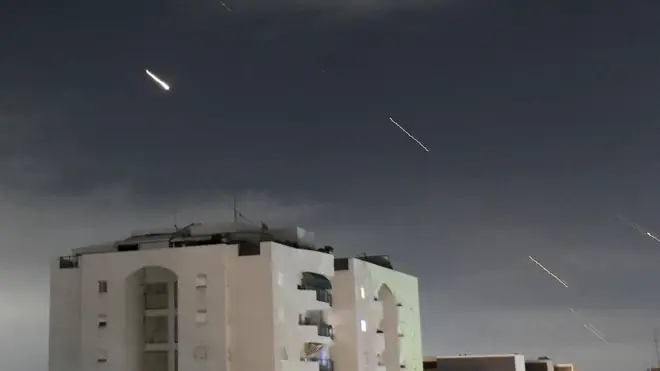
Regional tensions remain high, amid fears of further escalation in the event of a possible Israeli counter-strike.
Israel has hailed its successful air defences in the face of an unprecedented attack by Iran, saying it and its allies thwarted 99% of the more than 300 drones and missiles launched towards its territory.
But regional tensions remain high, amid fears of further escalation in the event of a possible Israeli counter-strike.
US President Joe Biden convened a meeting of leaders of the Group of Seven (G7) advanced democracies “to coordinate a united diplomatic response”.
The participants unanimously condemned the attack and said they “stand ready to take further measures now and in response to further destabilising initiatives”.
The US made clear it would not participate in any offensive action against Iran. “We don’t seek a war with Iran. We’re not looking for escalation here,” White House national security spokesman John Kirby told NBC.
Iran launched the attack in response to a strike widely blamed on Israel on an Iranian consular building in Syria earlier this month which killed two Iranian generals.
Israel said Iran launched 170 drones, more than 30 cruise missiles and more than 120 ballistic missiles early on Sunday.
By Sunday morning, Iran said the attack was over and Israel reopened its air space.
The two foes have for years been engaged in a shadow war marked by incidents such as the Damascus strike.
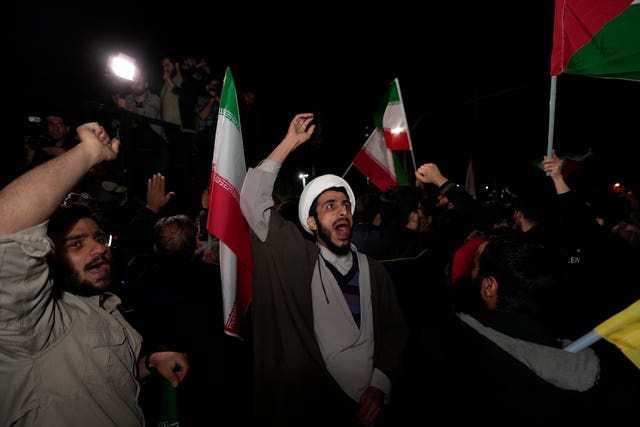
But Sunday’s assault, which set off air raid sirens across Israel, marked the first time Iran has launched a direct military assault on Israel, despite decades of enmity dating back to the country’s 1979 Islamic Revolution.
Israel has over the years established – often with the help of the United States – a multilayered air defence network that includes systems capable of intercepting a variety of threats including long-range missiles, cruise missiles, drones and short-range rockets.
That system, along with collaboration with US and other forces, helped thwart what could have been a far more devastating assault at a time when Israel is already bogged down in its war against Hamas in Gaza and engaged in low-level fighting on its northern border with Lebanon’s Hezbollah militia.
Both Hamas and Hezbollah are backed by Iran.
Israeli and US officials lauded the response to the aerial assault.
“Iran launched more than 300 threats and 99% were intercepted,” said Rear Admiral Daniel Hagari, the Israeli military spokesman.
“That is a success.”
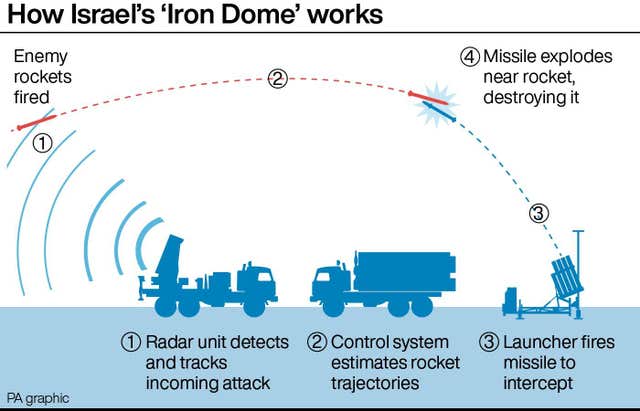
Asked if Israel would respond, Rear Admiral Hagari said the country would do what was needed to protect its citizens.
Rear Admiral Hagari said that none of the drones reached Israel, 25 cruise missiles were shot down by the Israeli air force and none entered Israel’s airspace.
He said most of the ballistic missiles were also intercepted.
Israeli Prime Minister Benjamin Netanyahu posted a short message on X, formerly Twitter, saying: “We intercepted. We blocked. Together, we will win.”
Defence minister Yoav Gallant also celebrated the results, thanking the US and other countries for their assistance, but warned that the incident was ongoing.
“This campaign is not over yet. We need to remain vigilant … and to prepare for any scenario,” he said in a video statement.
“At the same time, we blocked the first wave (of attacks), and we did it with great success.”
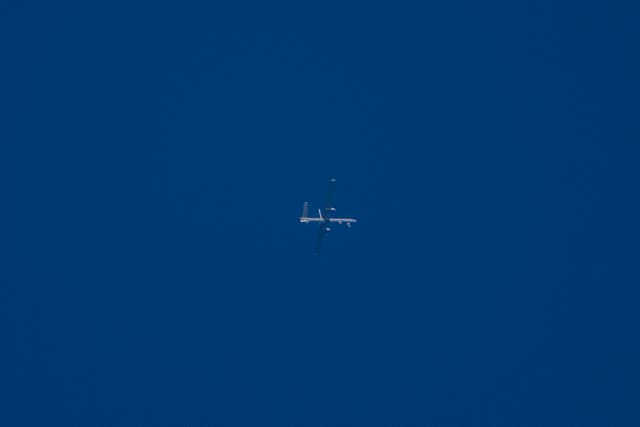
Rear Admiral Hagari said minor damage was caused to an Israeli airbase, but he said it was still functioning.
Rescuers said a seven-year-old girl was seriously wounded in southern Israel, apparently in a missile strike, though they said police were still investigating the circumstances of her injuries.
Israel announced it has reopened its airspace, loosening one restriction it had imposed ahead of the strike, although schools remained closed around the country.
Neighbouring Jordan also reopened its airspace.
General Mohammad Hossein Bagheri, the chief of staff of the Iranian armed forces, said the operation was over, the state-run IRNA news agency reported.
“We have no intention of continuing the operation against Israel,” he was quoted as saying.
Iran’s president, Ebrahim Raisi, claimed Iran had taught Israel a lesson and warned that “any new adventures against the interests of the Iranian nation would be met with a heavier and regretful response from the Islamic Republic of Iran”.

Iran’s Foreign Ministry on Sunday summoned the ambassadors of the UK, Germany and France after the three European nations condemned the Iranian attack on Israel.
The ministry said on its website that the ambassadors were called in over their governments’ “irresponsible stances” on the Iranian operation against Israel, which was in retaliation for a strike widely blamed on Israel on an Iranian consular building in Syria earlier this month.
Israel may be particularly proud of the success of its defence because it stands in sharp contrast to the failures it endured during Hamas’s attack on October 7.
Facing a far less powerful enemy in Hamas, Israel’s border defences collapsed and the military took days to repel the marauding militants – an embarrassing defeat for the Middle East’s strongest and best-equipped army.
While thwarting the Iranian onslaught could help restore Israel’s image, what it does next will be closely watched both in the region and in Western capitals.
In Washington, Mr Biden said US forces helped Israel down “nearly all” the drones and missiles and pledged to convene allies to develop a unified response.
Mr Biden, who had cut short a weekend stay at his Delaware beach house to meet with his national security team at the White House on Saturday afternoon, spoke to Mr Netanyahu later in the day.

“I told him that Israel demonstrated a remarkable capacity to defend against and defeat even unprecedented attacks – sending a clear message to its foes that they cannot effectively threaten the security of Israel,” Mr Biden said.
During the call, Mr Biden encouraged Israel to proclaim the interceptions a success against Iran and made clear the US would not participate in any offensive action against Iran, according to a senior administration official.
In a statement on Sunday, secretary of state Antony Blinken said the US does “not seek escalation”, and would hold talks with its allies in the coming days.
The US, along with its allies, has sent direct messages to Tehran to warn against further escalating the conflict.
Iran’s paramilitary Revolutionary Guard issued a new threat against the US.
“The terrorist US government is warned any support or participation in harming Iran’s interests will be followed by decisive and regretting response by Iran’s armed forces,” said a statement carried by IRNA.
Israel and Iran have been on a collision course throughout Israel’s six-month war against Hamas militants in Gaza, triggered by the October 7 attack on Israel.
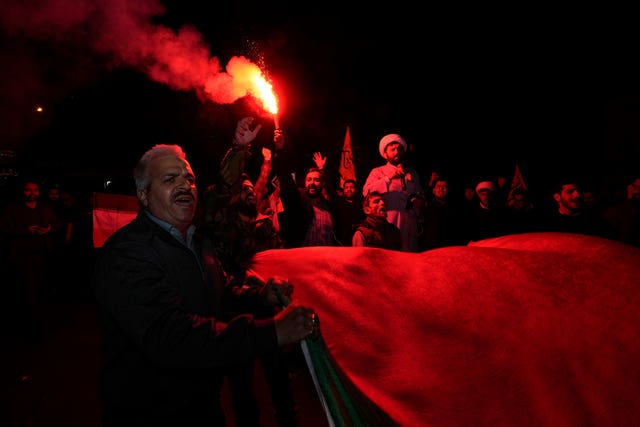
On that day, militants from Hamas and Islamic Jihad, also backed by Iran, killed 1,200 people in Israel and kidnapped 250 others.
An Israeli offensive in Gaza has caused widespread devastation and killed more than 33,000 people, according to local health officials.
Negotiations under way meant to bring about a ceasefire in exchange for the release of the hostages appeared to hit a setback on Sunday.
Mr Netanyahu’s office said that Hamas rejected the latest proposal for a deal, which had been presented to Hamas a week ago by mediators Qatar, Egypt and the United States.
A Hamas official said the group wants a “clear written commitment” that Israel will withdraw from the Gaza Strip during the second of a three-phase ceasefire deal.
The deal presented to the sides calls for a six-week ceasefire in Gaza, during which Hamas would release 40 of the more than 100 hostages the group is holding in the enclave in exchange for 900 Palestinian prisoners from Israel’s jails, including 100 serving long sentences for serious crimes.
Hamas welcomed Iran’s attack, saying it was “a natural right and a deserved response” to the strike in Syria and urged the Iran-backed groups in the region to continue to support Hamas in the war against Israel.
Almost immediately after the war erupted, Hezbollah began attacking Israel’s northern border.
The two sides have been involved in daily exchanges of fire, while Iranian-backed groups in Iraq, Syria and Yemen have launched rockets and missiles towards Israel.